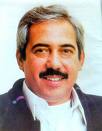|
Apn[a] L[a]rK[a]N[a] |
|
||||||||
|
|||||||||
|
|
Shaheed Mir Murtaza Bhutto
| Zulfiqar Ali Bhutto | Mohtrima Benazir Bhutto | Mir Murtaza Bhutto | Mir Shah Nawaz Bhutto | Fatima Bhutto |
|
PERSONAL DETAILS
Like his elder sister, Benazir, Murtaza Bhutto was a novice to active politics until 1978 when his father, Zulfikar Ali Bhutto, was sentenced to death by the Lahore High Court. In the span of 15 years, however, Murtaza has managed to gain considerable notoriety for a brand of politics that has moved in diametrically opposing direction to Benazir Bhutto's. Born in Karachi on September 18, 1954, Mir Murtaza received his early education at St. Mary's School, Rawalpindi. He later passed his `O' levels from the Karachi Grammar School in 1971. In 1972, Murtaza went off to Harvard University where he studied Government, specialising in strategic studies. He graduated with honours in 1976, and his thesis was entitled ``Modicum of Harmony'' which dealt with the spread of nuclear weapons in general, and the implications of India's nuclear capability for Pakistan in particular. Murtaza went on to Christ Church College Oxford, his father's alma mater, for a three-year course to read for an M.Lit. degree. But the death penalty awarded to his father in 1978 seriously disrupted his studies. Murtaza was on the verge of rushing home when he received a message from his father asking him to remain abroad where he could mobilise an international campaign for his release. Murtaza had been present in Pakistan when Zulfikar Ali Bhutto's government was overthrown on July 5, 1977. Along with other family members, Murtaza had returned to Al-Murtaza, Larkana, and at the time was busy helping in the preparations for the elections schedule for October 1977. But on September 16, 1977 when Bhutto was arrested from Al-Murtaza, he ordered his son to leave the country. After Bhutto was sentenced, Murtaza joined hands with his brother the late Shahnawaz Bhutto, to initiate a campaign to muster international support to revoke the death penalty looming over his father's head. Leaders from Syria, Libya, and the PLO were particularly supportive. Mercy appeals were sent by several heads of state to General Ziaul Haq which failed, however, to sway his decision. Murtaza and Shahnawaz both cut short their respective educations and decided to devote themselves to avenge their father's death. Eventually they resorted to taking up arms, their main target being General Ziaul Haq. This marked the beginning of a new and more controversial era in Murtaza's life. The Al-Zulfikar Organization (AZO) was born at this point, and disgruntled elements among the younger members of the PPP, disappointed in the party's leadership, flocked to Murtaza's side. The AZO, however, went on to earn the terrorist charge, a label which has dogged Murtaza ever since. For his part, he has always denied the charge that he espouses the politics of terrorism. "Why is the AZO called a terrorist organisation? Why are we blamed for treason or sedition? What General Zia did to the constitution and to the elected prime minister of the country was real treason. What we did was something that every patriotic Pakistan should do in order to safeguard the interest of the country," Murtaza maintains. The most controversial episode of Murtaza's career was the hijacking of PIA airliner by AZO activists, which resulted in the death of a passenger. Murtaza still faces a murder charge on this count. From 1981, Mir Murtaza has spent most of his time in Damascus. Earlier, in the early '80s, he was based in Kabul and then in Libya. With the mysterious death of Shahnawaz Bhutto in Paris in 1985, Murtaza Bhutto was left alone to carry on the struggle. During his period, his sister's politics had drifted further away from Murtaza's. The PPP, meanwhile, remained forever under the shadow of being labelled a terrorist party, and many of its activists were arrested and hounded for their alleged links with the AZO. Over the years, the PPP has moved steadily towards the center, coming to power once again, being unceremoniously ousted and making yet another bid for government again, but this time with a less hostile establishment breathing down its neck than ever before. Murtaza has stayed away from Pakistan for the last 16 years dring which time his name has been closely associated with the AZO. Murtaza now claims that the AZO has been disbanded and it remains to be seen what new role he will take in the machiavellian politics of the '90s. In this exclusive interview with the Herald, conducted long distance over the telephone, Murtaza Bhutto finally breaks his silence about his plans to return to Pakistan, criticises the line the PPP leadership has taken in recent years, reveals his decision to focus his attention on Sindh and vehemently denies charges of being a pawn in the hands of the intelligence agencies.
He was brave son of Zulfiqar Ali Bhutto! |
